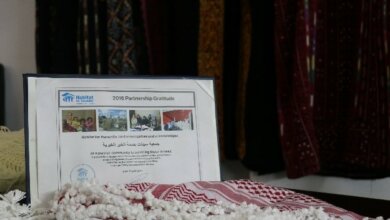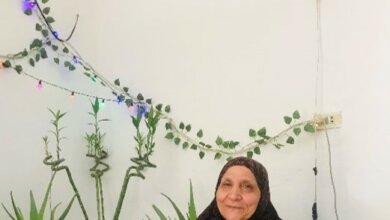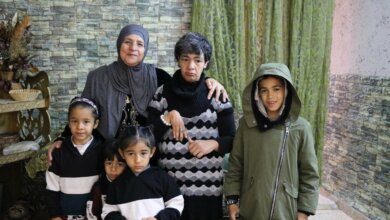

Usual vs. Unusual

In the Middle Eastern communities, it is unusual to see an old person lives alone without his/ her family or without any kind of support. The middle eastern culture, which strongly derives its rituals, beliefs, and practices from religious teachings and family unity, urges for supporting elderly people with money, love, and care to save their faces, and enable them to live the rest of their life in a dignified way.
However, Mohammad Shhadeh, a Syrian old man who is in his seven decade lives alone without a family supporting him, as he did not get married, and the Syrian crisis scattered his family into different directions to be at the end of the resort left alone. “I used to live my life in the middle of seas and oceans. I was a chief cooking tasty food for sailors and those who were traveling on
ships. Therefore, I spent almost the whole of my life travelling around the world, without thinking of making a family”, he stated. “30 years ago, I chose to stay in Jordan. However, I made sure to keep in touch with my family in Syria. I opened a small restaurant here in Amman, but unfortunately, the circumstances were against me, and I had to close it after I had been broke, then I started to think to go back to my homeland: Syria”, he continued. “At that time, the situation in Syria have become really complicated. In fact, the Syrian conflict was ignited, and the war prevented anyone from thinking to go back. Then after a while from the crisis, I lost connections with family members there, and now I know nothing about them till now. That is why I am living alone with no one visits me or know anything about me”.
How Did M. Shhadeh’s Life look like?
Mohmmad Shhadeh, the 74-year-old man, lives today in a small room. The room’s landlord and his son are careful to see Mohammad almost 3 times a week, sending him food and water. Not only the landlord and his son who do this, but also a few Sheikhs who usually wonder in the neighborhood to check if there are any needy people around to offer them help accordingly.
Few months ago, Mohammad started to feel pain in his left leg. After a while, the pain extended and reached the other leg, his waist, and reached his back. After collecting an amount of money from neighbors, he went to several doctors, ending up with a diagnosis of having a cancer in his spine. The cancer causes severe pain in his bones and other complications, specifically the lower part of his body.
From that time until now, M. shhadeh tries to combat his illness by taking pain killers only, as he cannot afford the high medical treatment expenses of cancer. He collects money from any one he meets not to eat or drink, but to buy pain killers. In addition, his movement has become more difficult; he cannot stand easily, and he cannot go to the toilet, he also cannot have a shower alone.
Habitat Jordan Intervention

When Habitat Jordan knows about M. Shhadeh, they hurry to conduct a socio-economic assessment to him. Habitat Jordan’s team found that M. Shhadeh has no income, no company to take care of him, and he lives in one small home with minimum standards of living. The so-called home (which is only a room with a toilet with terrible conditions) has a small gate, broken window, a hall in one of its walls, and has no kitchen. The toilet also was old and dirty, with no shower, and has a step down which hinders M. Shhadeh from entering it easily without the possibility of losing his balance and falling.
Quickly, Habitat Jordan conducted a maintenance work to make performing the daily practices easier for their old beneficiary. They fixed the window and close
the hall to protect him from the cold and rain wind in winter and insects in Summer. They fixed a new toilet, a new shower, and removed the step to make the ground their level. They also widen the front gate, so M. Shhadeh can go in and out of his home easily with his crutches, and fixed handrails for PWDs to help him stand up and sit down from and on his bed.
On a further level, Habitat Jordan team keeps thinking of how to help Shhadeh in terms of his health condition. The team depends on its referral mechanism to look for a specialized entity to support the old man. After 3 days, the team could network with The Jordanian Hashemite Fund for Human Development (JOHUD): a local NGO which implements one of UNHCR’s projects for helping Elderly people and PWDs.
What About Now?
M. Shhhadeh now is having a better home in which performs his daily activities at his place easier than

before. He gets two visits a week from 2 female care givers from JOHUD; they clean his home and his bed, shower him, provide him with diapers for adults, and make sure that he is okay. He also has been provided by some equipment to ease his movement at his home or even outside if he needs to go out, such as a walker.
The coming phase in M. Shhadeh’s story is to convince him to move to live in an elderly house, as he refuses to live there. Both Habitat Jordan team and the caregivers nowadays are trying to convince him to do so in order to start a new healthy social life with new friends and family he could make there, as well as get regular checks from doctors and nurses there for free to follow his health condition, hoping him to get better soon and live the rest of his life surrounded by others.


